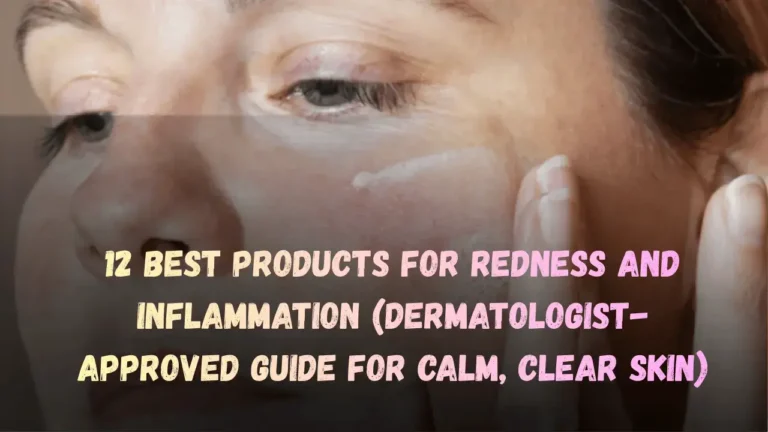Postpartum life brings many changes some beautiful, some overwhelming, and some that show up on your skin. From unexpected breakouts and dryness to pigmentation and sensitivity, postpartum skin changes are more common than most new parents realize. The shift in hormones, sleepless nights, and stress can take a toll not only on your body, but also on your skin’s overall health and appearance.
Discover dermatologist-approved skincare tips for postpartum skin changes. Learn causes, remedies, routines & safe ingredients for new moms and dads.
In this guide, we’ll share practical, dermatologist-approved skincare tips for postpartum skin changes that are safe, effective, and easy to follow even when you only have a few minutes to yourself. Whether you’re a new mom or dad, this step-by-step skincare approach will help you regain confidence and nurture your skin during this new chapter of life
Understanding Postpartum Skin Changes (and Why They Occur)

The postpartum phase often called the fourth trimester is a time of major physical and emotional adjustment. One of the most noticeable changes many new parents experience is a shift in their skin. These skin changes may appear gradually or suddenly, and while they are completely normal, they can still feel frustrating or unexpected.
After childbirth, your body begins to rebalance itself. Hormones like estrogen and progesterone, which were high during pregnancy, rapidly drop. At the same time, cortisol (the stress hormone) and prolactin (the breastfeeding hormone) fluctuate, creating a perfect storm for skin concerns. Add sleep deprivation, feeding schedules, lifestyle changes, and limited self-care time and your skin naturally reflects the transition.
Postpartum skin changes are not limited to mothers. While moms experience more intense hormonal shifts, new dads or partners may also notice skin issues triggered by stress, lack of sleep, and new routines.
Understanding why your skin is changing is the first step toward treating it with the right care. Below are the most common postpartum skin concerns many parents face:
Best Skincare Tips for Postpartum Skin Changes (Dermatologist-Approved)
Caring for your skin after childbirth doesn’t have to be complicated or time-consuming. With the right approach and a few smart product choices you can soothe irritation, rebalance your skin, and restore a healthy glow. These dermatologist-approved skincare tips for postpartum skin changes are designed to be safe, effective, and doable even with a busy newborn schedule.
Tip #1: Keep Your Routine Gentle and Minimal
Your skin is more sensitive during the postpartum period, so this is the time to simplify, not experiment.
What to do:
- Use a mild, fragrance-free cleanser (gel or cream based).
- Avoid harsh scrubs, strong fragrances, and high-alcohol products.
- Choose products formulated for sensitive or barrier-repair skin.
Keeping your routine gentle reduces inflammation and prevents barrier damage two major triggers for postpartum breakouts and irritation.
Tip #2: Choose Safe and Skin-Calming Ingredients
Not all ingredients are ideal during postpartum especially if you’re breastfeeding. The goal is to soothe, hydrate, and repair without irritation.
Dermatologist-recommended ingredients:
- Niacinamide: Reduces redness, acne, and strengthens the skin barrier.
- Hyaluronic Acid: Hydrates and plumps dehydrated skin.
- Ceramides: Rebuild the skin barrier and lock in moisture.
- Aloe Vera, Centella Asiatica, or Oat Extract: Calm sensitivity, itching, and inflammation.
Tip #3: Prioritize Moisture and Barrier Repair
Hormonal shifts can weaken your skin barrier, leading to dryness, rough texture, or irritation.
How to repair your barrier:
- Use a ceramide-rich moisturizer twice daily.
- Add a hydrating serum with hyaluronic acid.
- Apply occlusive balms (like petrolatum or squalane) at night if skin feels very dry.
A strong barrier means fewer breakouts, less sensitivity, and healthier-looking skin overall.
Tip #4: Treat Pigmentation and Dark Spots the Right Way
Postpartum melasma often seen as brown patches on the cheeks, forehead, or upper lip is common and may worsen with sun exposure.
Safe brightening ingredients to fade pigmentation:
- Vitamin C
- Azelaic Acid
- Niacinamide
- Licorice Root Extract
- Tranexamic Acid (dermatologist-approved but use cautiously when breastfeeding)
Consistency is key results take time, usually 8–12 weeks.
Tip #5: Never Skip SPF (Even Indoors!)
If there is one tip that makes the biggest difference, it’s daily sun protection.
Why SPF is crucial postpartum:
- Prevents melasma from darkening
- Avoids long-term sun damage
- Helps skin recover and stay even-toned
Choose a broad-spectrum SPF 30 or higher, and reapply every 2–3 hours if you’re outdoors. If your skin is easily irritated, try a mineral sunscreen with zinc oxide or titanium dioxide.
Step-by-Step Daily Skincare Routine for Postpartum Skin

When caring for a newborn, long self-care routines can feel impossible. The good news? You don’t need a 10-step routine to see results. A simple, consistent regimen can make a dramatic difference in calming irritation, restoring hydration, and improving postpartum skin concerns. Below is a quick, dermatologist-approved postpartum skincare routine designed for busy parents with options for both moms and dads.
Morning Routine (5 Minutes)
This routine helps hydrate, brighten, and protect your skin throughout the day.
1. Gentle Cleanser (30 seconds)
Start with a mild, fragrance-free cleanser to refresh the skin without stripping natural moisture.
2. Hydrating Toner or Mist (10 seconds)
A quick spritz or swipe boosts hydration perfect for tired, dehydrated skin.
3. Skin-Boosting Serum (30 seconds)
Choose Vitamin C or Niacinamide in the morning to brighten skin, reduce dark spots, and even skin tone.
4. Lightweight Moisturizer (30 seconds)
Apply a hydrating moisturizer with ceramides or hyaluronic acid to lock in moisture.
5. Sunscreen (The Most Important Step!) (20–30 seconds)
Finish with a broad-spectrum SPF 30+. This protects your skin from UV damage and prevents melasma from worsening.
Optional (30–60 seconds if time allows):
- Under-eye gel for puffiness
- Tinted SPF to replace foundation
Night Routine (7 Minutes)
Evening care focuses on repairing and restoring the skin while you sleep critical for postpartum skin recovery.
1. Cleanse (30–45 seconds)
Wash away sweat, oil, SPF, and pollutants. If you wore makeup or sunscreen, double cleanse with a gentle balm + water-based cleanser.
2. Hydrating Serum (30 seconds)
Apply a serum with hyaluronic acid, snail mucin, or centella asiatica to deeply hydrate and soothe the skin.
3. Barrier-Reinforcing Moisturizer (30–45 seconds)
Choose a thicker, nourishing night cream containing ceramides, peptides, or squalane to repair the skin barrier overnight.
4. Safe Active Treatment (2–3 minutes)
Use only one treatment per night to avoid irritation. Rotate based on your skin goal:
| Skin Concern | Safe Night Treatment Options |
|---|---|
| Acne/breakouts | Azelaic Acid 10–15% |
| Pigmentation/Melasma | Niacinamide, Azelaic Acid, Tranexamic Acid (derm-approved) |
| Dullness/Texture | PHA or Lactic Acid (mild exfoliation) (1–2x weekly) |
5. Optional “Skin Saver” Step
If skin feels extremely dry or irritated, apply a thin layer of petrolatum or squalane (“slugging”) to lock in moisture. Use 2–3 nights a week max.
Natural & At-Home Skincare Tips for Postpartum Skin Changes
If you prefer gentle, natural methods alongside your skincare routine or you simply want quick remedies using items you already have at home these at-home tips can help soothe postpartum skin. While natural solutions can’t replace dermatologist-recommended treatments, they can provide relief, hydration, and a calming boost when used consistently.
Below are safe, simple, and effective natural skincare tips for postpartum skin changes that fit into any new parent’s routine.
1. Soothe Puffiness & Tired Skin with Cold Therapy
Lack of sleep and stress can cause puffiness, especially around the eyes.
Try this:
- Apply chilled spoons, an ice roller, or a cold compress for 1–2 minutes.
- Keep green tea bags or cucumber slices in the fridge and place them over your eyes for 5–10 minutes.
This reduces inflammation, tightens skin temporarily, and gives a refreshed appearance.
2. Aloe Vera for Redness & Irritation
Aloe vera is naturally anti-inflammatory, hydrating, and soothing ideal for sensitive postpartum skin.
How to use:
- Apply a thin layer of pure aloe gel as a calming mask for 10 minutes.
- Rinse or leave on as a night gel if your skin tolerates it.
Tip: Choose 99% pure aloe vera with no added fragrance or alcohol.
3. Green Tea for Dark Circles & Dull Skin
Green tea is rich in antioxidants and tannins that help brighten skin and reduce under-eye swelling.
How to use:
- Brew 2 tea bags, refrigerate for 20–30 minutes, then place under the eyes for 10 minutes.
- Use cooled green tea as a gentle facial mist to refresh skin during the day.
4. Honey Mask for Hydration & Bacterial Control
Raw honey has natural antibacterial and humectant properties, making it great for mild acne and dryness.
How to use:
- Apply a thin layer of raw honey for 10–15 minutes.
- Rinse with lukewarm water once or twice a week.
Avoid if you have very sensitive skin or allergies to bee products.
5. Oatmeal for Itchy, Dry, or Sensitive Skin
Colloidal oatmeal helps calm irritation, repair the skin barrier, and lock in moisture.
How to use:
- Add ½ cup of colloidal oatmeal to a lukewarm bath.
- Soak for 10–15 minutes to relieve dry, itchy areas.
- You can also mix oatmeal with yogurt or honey for a soothing face mask.
6. Hydrate from the Inside Out
Skincare isn’t just topical your skin reflects your inner health too.
Helpful habits for postpartum skin:
- Drink water consistently throughout the day (set reminders if needed).
- Add hydration-rich foods like watermelon, cucumber, oranges, berries, and leafy greens.
- Include healthy fats such as avocado, nuts, seeds, and olive oil for glow and barrier strength.
7. Sleep, When You Can, Is Skincare
Yes, it’s easier said than done but sleep is a powerful skin-healer. Even small steps help:
- Aim for short naps when your baby sleeps.
- Try 10 minutes of deep breathing or meditation before bed to reduce stress.
- Keep a bedtime routine that signals relaxation for your body and skin.
When the mind rests, the skin recovers.
Ingredients to Look For (and Avoid) Post-Pregnancy

Choosing the right ingredients plays a huge role in how your skin heals and adapts after delivery. Postpartum skin can be more sensitive, reactive, and unpredictable so understanding what’s safe and effective (and what to avoid, especially if breastfeeding) helps you make confident skincare choices. Below is a simple guide to ingredients that support healthy postpartum skin, plus those best left out of your routine for now.
Safe & Effective Ingredients for Postpartum Skin
These ingredients are gentle, nourishing, and dermatologist-approved to help address common postpartum skin changes such as dryness, acne, sensitivity, and pigmentation.
| Ingredient | Why It Helps | Best For |
|---|---|---|
| Niacinamide | Soothes inflammation, reduces redness, controls oil, supports barrier repair | Acne, sensitivity, uneven skin tone |
| Hyaluronic Acid | Deep hydration, plumps skin, improves elasticity | Dryness, dullness, fine lines |
| Ceramides | Strengthen skin barrier, lock in moisture, reduce sensitivity | Dry or damaged skin barrier |
| Azelaic Acid | Brightens skin, reduces acne, safe in breastfeeding | Acne, pigmentation, melasma |
| Vitamin C (Ascorbic Acid or Derivatives) | Antioxidant, brightens, fades dark spots, boosts collagen | Uneven tone, dull skin, melasma |
| Centella Asiatica (Cica) | Anti-inflammatory, calming, repairs damaged skin | Redness, irritation, sensitive skin |
| Peptides | Supports collagen and firmness, improves texture | Dullness, early fine lines |
| Squalane | Lightweight hydration and barrier protection | Dry, irritated, or sensitive skin |
Ingredients to Avoid Post-Pregnancy (Especially if Breastfeeding)
Not all skincare ingredients are ideal during the postpartum stage. Some can be harsh on sensitive skin, while others may not be recommended while nursing.
| Ingredient | Why to Avoid | Notes |
|---|---|---|
| High-strength Retinoids (Retinol, Tretinoin, Adapalene) | Can be absorbed through skin; not recommended during breastfeeding | Safer alternative: Bakuchiol or Azelaic Acid |
| Hydroquinone | Skin-lightening agent with high absorption rate | Avoid while pregnant/breastfeeding |
| Strong Chemical Peels (AHA/BHA over 10–20%) | Can cause irritation, peeling, sensitivity | Choose milder options like lactic acid or PHA |
| Salicylic Acid (Above 2%) | Higher strengths may cause dryness or irritation | Low % leave-ons or wash-offs are generally considered safe in moderation |
| Retinoid Body/Face Lotions marketed for anti-aging | Same concerns as facial retinoids | Patch test alternatives if needed |
| Benzoyl Peroxide (Over 2.5%) | May cause irritation & dryness on sensitive postpartum skin | Try azelaic acid for acne instead |
| Products With Strong Fragrance or Alcohol | Can disrupt the weakened skin barrier | Choose fragrance-free formulas |
When to See a Dermatologist
While many postpartum skin changes can be managed at home with gentle care and consistency, there are times when seeking professional help is the best step forward. A dermatologist can provide personalized treatments, safe prescriptions (if needed), and guidance tailored to your postpartum skin concerns especially if over-the-counter products aren’t giving results.
Below are signs that it may be time to book an appointment:
1. Persistent or Severe Acne That Isn’t Improving
Hormonal acne is common after childbirth, but if breakouts are:
- Painful or cystic
- Spreading rapidly
- Leaving deep marks or scars
…it’s best to see a dermatologist. They can recommend safe postpartum treatments, including topical antibiotics, azelaic acid prescriptions, or other low-risk options for nursing parents.
2. Melasma or Dark Patches That Continue to Worsen
If brown patches on your face (especially around the cheeks, forehead, or upper lip) don’t improve after consistent SPF use and brightening ingredients, a dermatologist may suggest:
- Prescription-strength creams
- Chemical peels safe for postpartum
- Laser treatments (usually after breastfeeding)
Early intervention prevents pigmentation from deepening.
3. Skin Reactions, Rashes, or Allergies
If you’re experiencing:
- Itchy red patches
- Burning sensation from products
- Sudden eczema or dermatitis
…it may mean your skin barrier is compromised or reacting to an ingredient. A dermatologist can identify triggers and provide gentle, effective treatment.
4. Suspected Infection or Painful Skin Symptoms
If skin is swollen, oozing, hot to the touch, or unusually painful, seek medical attention. These may indicate an infection or a condition that requires prescription care.
5. You Want Safe, Personalized Postpartum Skincare Advice
If you’re unsure which ingredients or products are safe for:
- Breastfeeding
- Sensitive postpartum skin
- Hormonal conditions like melasma or acne
…a dermatologist can guide you with a tailored routine, so you don’t have to guess or experiment.
Why Professional Care Helps Postpartum Skin
A dermatologist can:
- Recommend safe treatments that work quickly
- Prevent long-term scarring or pigmentation
- Ensure your routine is breastfeeding- and postpartum-safe
- Update your skincare as your hormones rebalance
Even one consultation can streamline your routine and save time, effort, and money on products that may not work for your skin.
Skincare Tips for Postpartum Skin Changes for Dads Too

Postpartum skin changes aren’t limited to mothers. While moms experience the strongest hormonal shifts, new dads and partners can also notice changes in their skin due to disrupted sleep, increased stress, and lifestyle adjustments that come with caring for a newborn. Lack of rest, irregular eating, and limited self-care time can take a noticeable toll on skin health.
Here are simple and realistic skincare tips for dads navigating the postpartum phase:
1. Keep a Quick, No-Fuss Routine
Many dads prefer simple routines, so here’s a fast and effective version:
Morning (2 minutes):
- Splash face with water or use a gentle cleanser
- Apply a lightweight moisturizer
- Add SPF 30+ if going outside
Night (3 minutes):
- Cleanse to remove oil and sweat
- Use niacinamide or aloe gel to calm and rebalance skin
- Apply moisturizer
This minimalist routine supports skin health without feeling time-consuming.
2. Manage Stress-Related Breakouts
Stress can increase cortisol levels, which may trigger acne or excess oil production in dads.
What helps:
- Use a gentle salicylic acid face wash 2–3 times a week
- Apply niacinamide to calm inflammation and prevent breakouts
- Avoid picking or squeezing pimples to prevent marks
A consistent routine (even short!) makes a noticeable difference.
3. Prioritize Hydration & Sleep When Possible
Just like moms, new dads often struggle with irregular sleep, which can lead to:
- Dull, tired-looking skin
- Puffiness
- Dark circles
Mini self-care tips for dads:
- Drink water throughout the day (keep a bottle nearby)
- Splash cold water or use a cold compress under the eyes
- Take brief power naps when possible
Even small changes support healthier-looking skin.
4. Share Skincare with Your Partner
If both parents use similar gentle, hydrating products, it saves time and money. Many postpartum-safe ingredients like ceramides, hyaluronic acid, and niacinamide work beautifully for male skin too.
A shared “family skincare basket” near the sink or nightstand can make routines easier for tired parents.
5. Boost Skin Health from Within
Healthy lifestyle habits support skin recovery for dads as well:
- Choose water-rich snacks (cucumber, oranges, apples)
- Add nuts, seeds, or yogurt for skin-friendly nutrients
- Step outside for fresh air and sunlight when possible
These small habits contribute to skin clarity, energy, and overall wellness during the postpartum phase.
Conclusion
Postpartum skin changes are completely normal and often temporary but that doesn’t mean you have to struggle through them without support. With gentle care, the right ingredients, and a simple routine that fits into your new lifestyle, your skin can gradually regain balance, strength, and radiance. Remember, healing takes time, and every small step you take toward consistency makes a meaningful difference.
Whether you’re a new mom or dad, prioritizing skincare isn’t about vanity it’s an act of self-care during one of the most transformative periods of life. Be patient with your skin as your body adjusts, and don’t hesitate to seek professional guidance if something doesn’t feel right.
If these skincare tips for postpartum skin changes helped you, share this guide with a new parent who may need it too. And if you’d like more expert-backed skincare advice tailored for busy parents, stay tuned for our upcoming posts!
For more Skin Care Tips and Tricks, Please visit gleona.com.
FAQs
1: How long do postpartum skin changes last?
Postpartum skin changes usually improve within 3–6 months as hormone levels stabilize. However, conditions like melasma or acne may take longer to fade and may require targeted treatment or dermatologist support. Consistent skincare can help speed up recovery.
2: Can I use active skincare ingredients while breastfeeding?
Yes, but with caution. Gentle, safe ingredients like niacinamide, hyaluronic acid, ceramides, and azelaic acid are generally considered safe. Avoid high-strength retinoids, hydroquinone, and strong chemical peels. When in doubt, consult a dermatologist to ensure your routine is breastfeeding-safe.
3: What is the best skincare routine for postpartum skin changes if I have no time?
A minimal 3-step routine works well:
Morning: Cleanser → Moisturizer → SPF
Night: Cleanser → Hydrating serum → Moisturizer
Focus on consistency rather than the number of steps—this helps balance and repair your skin even on the busiest days.






